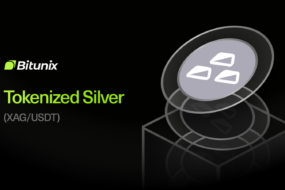
Smart contracts might sound like some complex technical invention, but if you’ve used any DeFi platform or bought an NFT, you’ve already used one — whether you realized it or not. These contracts are the invisible backbone behind many blockchain-based tools.
They don’t just store information. They do things. They act, they enforce, and they execute. And they’re being used across the crypto world to speed up transactions, reduce risk, and get rid of unnecessary middlemen. This guide takes a real-world look at what smart contracts are, how they operate, and what makes them useful — especially when integrated into platforms like Bitunix.
What Are Smart Contracts?
To put it simply, a smart contract is a piece of code that runs on a blockchain. It follows a rule: “If this happens, then do that.” It sounds basic, but the applications are anything but. That line of logic can run a billion-dollar lending platform or distribute NFT royalties automatically — no human required.
The original idea came from Nick Szabo in the early ’90s, long before Ethereum was created. But Ethereum was the first to make it practical and scalable. Since 2015, these contracts have become the core of how decentralized apps operate.
What makes them different from traditional contracts is that once they’re live, they don’t wait on anyone. They just execute. Automatically. No emails, no signatures, no follow-ups. They either run or they don’t — based strictly on the conditions coded in.

How Smart Contracts Actually Work
1. Writing the Contract
Every smart contract starts with code. A developer writes the instructions that define what the contract should do. For example, “If someone sends 1 ETH, then release access to a certain token.” The language most often used is Solidity (for Ethereum), but other chains have their own systems too.
2. Deploying It
Once the code is ready and tested, it’s uploaded to a blockchain. That’s where it lives — permanently. After deployment, the contract can’t be edited. It’s public, transparent, and verifiable.
3. Waiting for a Trigger
The contract doesn’t run all the time. It just sits there until something sets it off — like receiving a transaction or meeting a certain block number. Once that condition is hit, the contract moves into action.
4. Execution
Now the magic happens. The code carries out the instructions immediately. Whether it’s transferring assets, minting tokens, or processing a loan, the smart contract finalizes it, records the outcome on-chain, and ends the task. No external approvals needed.

Why Smart Contracts Matter
No Room for Tampering
Once they’re live on-chain, smart contracts can’t be modified. That permanence means nobody — not even the original developer — can go in and tweak the terms later. It’s locked.
Transparent to All
You can read any smart contract’s code. You can see every action it takes. This openness makes it easy to build trust, especially in finance, where hidden conditions are common.
Speed and Accuracy
Smart contracts react the moment something happens. No delay. No approval needed. If the rule is met, the result follows. It’s fast and consistent, which is perfect for trading environments or time-sensitive actions.
Saving Time and Money
These contracts don’t need a lawyer, bank officer, or any third party to step in. That removes unnecessary fees and cuts down on all the slow-moving admin work that usually comes with agreements.
Where Smart Contracts Are Used
Decentralized Finance (DeFi)
Most DeFi platforms — like Aave, Compound, or Uniswap — wouldn’t exist without smart contracts. These protocols use them to automate everything from loan repayments to token swaps. No one manages these processes manually; it’s all pre-coded logic running in real-time.
NFT Sales and Marketplaces
NFT platforms use smart contracts for minting, bidding, and transferring ownership. When you buy an NFT on OpenSea or Rarible, there’s no middleman — just a smart contract ensuring the token changes hands securely.
Real-World Use: Insurance and Property
Insurance platforms are experimenting with smart contracts to automate claims — for example, auto-payments after a natural disaster. In real estate, they’re starting to be used for things like rental agreements or escrow handling.
How Bitunix Uses Smart Contracts
Trade Execution That Sticks
When a user confirms a trade on Bitunix, that transaction is processed through a smart contract. What that means is once it’s confirmed, it’s final — no reversing, no editing. The rules that govern the trade are already locked in before you even hit the button. Once executed, the transaction can’t be changed by anyone, which is a big win for user trust.

Auto-Triggered Safety Nets
Smart contracts on Bitunix are also behind some of the platform’s protective tools. For example, if you’ve set a stop-loss or are using margin, the smart contract is what makes sure your trade closes out before losses pile up. These tools don’t rely on staff or manual monitoring. They react instantly to market changes and protect your position before it’s too late.
Knowing the Cost Before You Commit
On Bitunix, fees aren’t hidden. They’re not adjusted mid-trade either. Before you even complete a transaction, the smart contract shows you exactly what you’ll be charged. Once you agree, the contract locks it in. No surprises.
Smart contracts aren’t there to make things fancy. They’re there to make things fair, transparent, and fast — and that’s what we aim for at Bitunix. — Bitunix Team
Conclusion
Smart contracts are more than just a crypto trend — they’ve become essential. They automate agreements, prevent tampering, and reduce friction across all kinds of digital transactions. Whether you’re taking a loan, buying an NFT, or placing a trade on Bitunix, a smart contract is likely what’s making it all happen.
Bitunix isn’t using smart contracts just for show. It’s using them to create a smoother, safer experience for users — one where terms are clear, trades are final, and tools react faster than you ever could manually. If you’re serious about crypto, understanding smart contracts isn’t just helpful — it’s necessary.
FAQ
- Are smart contracts safe? Yes — at least the well-written ones. Once deployed, they can’t be altered, and their execution is recorded on-chain. But like any software, bugs can exist, so audits matter.
- Can you update a smart contract after launch? Not directly. Most of the time, updates mean writing and deploying a new contract. The original one stays as-is forever.
- What does Bitunix use smart contracts for? Trade execution, stop-loss tools, margin protections, and showing fees upfront. It’s all about creating a system that behaves exactly as promised.
- Do smart contracts only work with Ethereum? No. While Ethereum made them popular, other blockchains like BNB Chain, Solana, and Avalanche also support smart contract functionality.
Key Takeaways
- Smart contracts are self-run programs that enforce rules without third-party involvement.
- They’ve become a key part of DeFi, NFT sales, and trading automation.
- Bitunix uses smart contracts to improve trade reliability, risk protection, and cost transparency.
- The technology helps eliminate fraud, speed up actions, and reduce unnecessary fees.
Fun Facts
- “Smart contract” was first mentioned in 1994 by Nick Szabo.
- Ethereum brought them to public blockchains in 2015.
- Over $100 billion is currently secured in DeFi smart contracts.










One reply on “Understanding Smart Contracts: Bitunix Guide for 2025”
I think other site proprietors should take this web site as an model, very clean and great user friendly style and design, as well as the content. You are an expert in this topic!